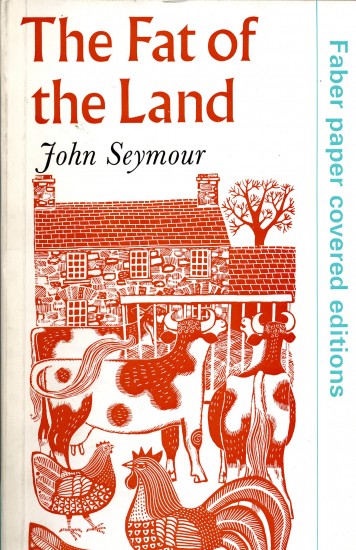We have talked about this for ages and next week, at last, it becomes a reality. I guess it’s time to explain just what it is. For the last few months we have been asking folk what are their three favourite nature books and then getting them to write a couple of hundred words on their number one. The plan is that together they will become an ever growing archive pointing people in the direction of the very best in nature writing – the place to come to when you have finished all your Deakin and want to know where to go next. We will expand on the idea behind it a little more when we launch it properly next week but in the meantime here is a taster; Richard King telling us (in way more than a couple of hundred words) about his favourite, ‘The Fat of the Land’ by John Seymour, originally published by Faber in 1961.
When John Seymour sat down to write The Fat of the Land at the end of the 1950s, he would have shrugged off as ridiculous any suggestion that his story of converting a gamekeeper’s cottage in Suffolk, would become a textbook cum roadmap for the trip back to nature that thousands would embark on in the next two decades, looped back to whence they came, canned laughter and all, into the suburban beige of The Good Life and a formalized idea of “downsizing”. Such a legacy would be anathema to a character as delightfully cussed as Seymour, as he writes in the closing chapter:
“Who am I to give advice? I am stumbling about trying to find out how to do things myself: I need advice”
The Fat of The Land is a rambling and wonderfully stubborn description of a family trying to live off five acres, namely Goose Bit, The Hill, Star Goose, Bob Carr’s Marsh, The Warren and not much else. Illustrated beautifully by Seymour’s wife Sally, it’s hard not to be seduced by its willing subjugation to the earth. Seymour gleefully admits to a never-ending series of mistakes and bad decisions in establishing a truly rural base for his family. This sense of ad hoc peasantry was no doubt a pull on anyone considering fleeing the city. But as Seymour reminds us on page after page, getting it together in the country means sixteen hour days of butchery, aching backs, frozen knees saturated in blood and mire – and no money. Instead an almost visionary delight at the world around you:
“Our flower garden is a thing still in our imagination…but there are wild flowers, and blossoms on the wild plum trees, and the beautiful woods and marshes, and the cries of the marsh birds coming to us at night as we lie in bed, and the song of the nightingales in the summer time-
the Blackbirds and the thrushes sing on every green tree,
and the larks they sing melodious at the dawning of the day
-as they sing in our local pub.”
The marital bed is serenaded by the Curlew, and the meadows blossom into folk song in the pub. Seymour, in all probability unconsciously, turns such flights of bucolic reverie into a workaday idyll on every page. Seymour is also fond of a certain militancy towards the modern world, the kind that nowadays turns up in organic cookery and lifestyle books. Where you stand on this will depend on your definition of common sense. Seymour, without a trace of irony, but never lacking in opprobrium, is always crystal clear on his priorities. Take his views on garden tractors:
“Further they make a terrible noise, and I like to hear the birds singing when I work. I think that is very important.”
The Fat of the Land is the nearest thing we have to Walden, but replaces Thoreau’s transcendentalism – and his limited diet, Seymour reckons “Thoreau was prepared to live exclusively on beans” – with hard bloody graft. Though Seymour, for all his stress on toil and sweat, is not without romance either:
“My own belief is that – if a man is entitled to nothing else – he is entitled to his share of the land surface of his own country”
I would have paid good money to see Seymour argue his case to the Countryside Alliance or whoever they thought they were back then.
John Seymour went on to write the best selling Complete Book of Self-Sufficiency, published in a very successful Richard Scarry-for-adults format, but lacking the romance of The Fat of the Land’s starriness and Sally Seymour’s elegant drawings. The Seymours moved to Pembrokeshire where Seymour died in 2004. To think of him up in the Preselis, overlooking Carningli, dotted with houses and settlements, where his books no doubt reside on nearly every shelf, is as enriching, exhilarating, and as singular a pleasure, as listening to The Lark Ascending.
